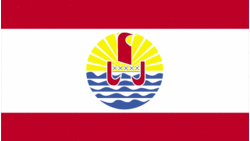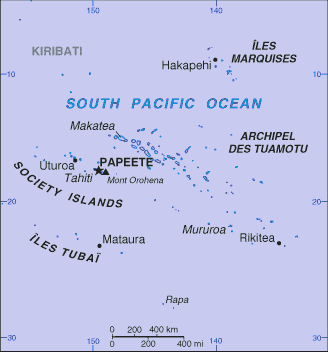Traveling Luck for French Polynesia. French Polynesia, Oceania
French Polynesia is located in Oceania, archipelagoes in the South Pacific Ocean about one-half of the way from South America to Australia.
Land in French Polynesia is mixture of rugged high islands and low islands with reefs.
French Polynesian land covers an area of 4167 square kilometers which is slightly less than one-third the size of Connecticut
 French Polynesian national flag (Flag of French Polynesia)
French Polynesian national flag (Flag of French Polynesia)
As for the French Polynesian climate; tropical, but moderate.
French Polynesian(s) speak French 61.1% (official), Polynesian 31.4% (official), Asian languages 1.2%, other 0.3%, unspecified 6% (2002 census).
Places of note in French Polynesia
 French Polynesian map
French Polynesian map
Regions of French Polynesia
The French annexed various Polynesian island groups during the 19th century. In September 1995, France stirred up widespread protests by resuming nuclear testing on the Mururoa atoll after a three-year moratorium. The tests were suspended in January 1996. In recent years, French Polynesia's autonomy has been considerably expanded.
Since 1962, when France stationed military personnel in the region, French Polynesia has changed from a subsistence agricultural economy to one in which a high proportion of the work force is either employed by the military or supports the tourist industry. With the halt of French nuclear testing in 1996, the military contribution to the economy fell sharply. Tourism accounts for about one-fourth of GDP and is a primary source of hard currency earnings. Other sources of income are pearl farming and deep-sea commercial fishing. The small manufacturing sector primarily processes agricultural products. The territory benefits substantially from development agreements with France aimed principally at creating new businesses and strengthening social services.
French Polynesian natural resources include timber, fish, cobalt, hydropower
includes five archipelagoes (4 volcanic, 1 coral); Makatea in French Polynesia is one of the three great phosphate rock islands in the Pacific Ocean - the others are Banaba (Ocean Island) in Kiribati and Nauru
French Polynesian religion is Protestant 54%, Roman Catholic 30%, other 10%, no religion 6%.
Natural hazards in French Polynesia include occasional cyclonic storms in January.
Travel Advice for French Polynesia
French PolynesiaSUMMARY
- French Polynesia is a French Overseas Territory. There is no formal diplomatic or consular representation. The General section of this Travel Advice gives you more information.
- The threat from terrorism is low. But you should be aware of the global risk of indiscriminate terrorist attacks which could be against civilian targets, including places frequented by foreigners.
- Although the risk from crime is also low, it does exist and you should take normal common-sense precautions.
- Many hundreds of British tourists visit French Polynesia each year. Most visits are trouble-free. The main type of incident for which British nationals require consular assistance is for lost or stolen passports.
- Tropical storms including cyclones can occur between the months of November and April.
- We strongly recommend that you obtain comprehensive travel and medical insurance before travelling to French Polynesia. You should check any exclusions, and that your policy covers you for the activities you want to undertake. Please see: Travel Insurance.
SAFETY AND SECURITY
GENERAL
There is no resident British Diplomatic Mission in French Polynesia. Routine consular matters are covered by the British Embassy in Paris. In case of emergency, contact the Honorary British Consul in French Polynesia, P O Box 50 009, Pirae, 98716 Tahiti; (tel: +689 706 382; fax: +689 42 00 50).
Money
If you intend to use a credit card during your stay, you should be aware that only Visa, Mastercard, Amex, Diners and JCP (Japan) are widely accepted in French Polynesia. Holders of other cards may encounter difficulties in obtaining cash and paying for goods.

 Search
Search French Polynesia country profile
French Polynesia country profile Travel advice for French Polynesia
Travel advice for French Polynesia